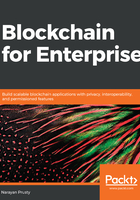
Corda
Corda is a platform on which to build your own permissioned DLT-based applications. Corda is a product of R3. R3 is an enterprise software firm working with over 100 banks, financial institutions, regulators, trade associations, professional services firms, and technology companies to develop Corda. The latest version of Corda is 1.0, which aims to replace legacy softwares used for financial transactions, and enables organisations to digitalize various business process that were cumbersome using legacy software systems:

The preceding diagram shows the high level architecture of a Corda network. Let's understand Corda's architecture at a high level. The idea of R3's Corda is to provide a shared trusted ledger for financial transactions. R3's Corda is not a blockchain platform, therefore there is no concept of blocks, global broadcasts, and so on. All the transactions are point to point. Corda applications are not decentralized. In Corda, smart contracts are called as CorDapps and they are written in either Java or Kotlin.
Infrastructure services form the nodes in the network that should be hosted by the trusted parties. Network Map publishes IP addresses of all the other nodes, so that nodes can reach out to other nodes. Permissioning service gives permission to nodes to join the network ; the node will receive a root-authority-signed TLS certificate from the network's permissioning service if permitted to join the network. Notaries provide transaction ordering and time stamping services (optionally, a notary also acts as the timestamping authority, verifying that a transaction occurred during a specific time-window before notarizing it). A notary service may be a single network node, a cluster of mutually-trusting nodes, or a cluster of mutually-distrusting nodes.
Notaries are expected to be hosted by enterprises that the network doesn't trust, therefore consensus is required between the notaries, due to which Corda provides various pluggable consensus protocols, such as Raft, BFT, and so on.
Sometimes, Corda applications need to depend on external application APIs. For example, a multi-currency bank-to-bank payment application built using Corda will need to fetch the exchange rate. In this scenario, the node initiating the transaction can fetch the exchange rate and put on the transaction, but how can you trust that node? Also, every node cannot simply re-fetch the exchange rate to verify if it's correct because by the time other nodes fetch it the rate might have changed, and also this is not a scalable solution. Therefore, Corda provides oracles to solve this issue. There can be one or more oracles in the network. An Oracle is a service that acts as a bridge for communication between two applications. In Corda, the transaction initiator can fetch the information from outside the Corda network and get the information signed from Oraclize to prove its validity. Optionally, Oraclize can also provide the information to the transaction initiator on request. Obviously, the Oraclize should be hosted by trusted parties with respect to what information they provide and sign.
Corda supports any pluggable RDBMS (currently, it is using the H2 database) to store smart contracts data. Data privacy is maintained as to which nodes can see the transactions. Multisignature support is also given by the framework, which enables multiple nodes to sign a transaction. One of the major downsides of Corda is that as there is no global broadcasting, each node has to maintain its own backup and failover redundancy in a traditional way as there is no redundancy built into the network. A node will store transactions and retry sending the messages to the recipient until the recipient has successfully received it. Once the messages are received, the sender has no more responsibility.